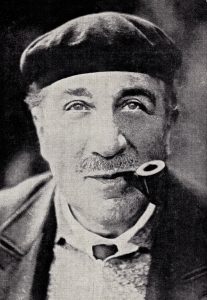The cult of the dead is a fine custom; and All Souls Day falls where it should, at the moment when the visible signs make it quite clear that the sun is abandoning us. The dry flowers, the red and yellow leaves under our feet, the long nights, and the lazy days which seem like evenings, all this makes us think of fatigue, of rest, of sleep, of the past. The end of the year is like the end of the day and like the end of a life; so, as the future offers only night and sleep, our thoughts naturally return to what’s been done and we become historians. There is harmony between customs, the weather, the time of year and the course of our thoughts. So more than one person, in this season, will evoke and speak to the shades.
But how to evoke them? How to please them? Ulysses gave them food to eat; we bring them flowers; but all these offerings are only to turn our thoughts towards them and to get the conversation under way. It’s quite clear that it’s thoughts of the dead we wish to evoke, not their bodies; and it’s clear that those thoughts sleep within us. This does not prevent the flowers, the wreaths and the flowers on the tombs from having a meaning. In the same way that we do not think as we would like to, and the course of our thoughts depends principally on what we see, hear and touch, it is quite reasonable to give ourselves certain sights, in order to give ourselves the reveries that are attached to them. This is how religious rites have a value. But they are only a means; they are not the end; so we should not visit the dead in the same way that others listen to the Mass or say their rosary.

The dead are not dead, that’s clear because we are alive. The dead think, speak and act; they can desire, approve, blame, give advice; all that is true; but we must understand this. All that is inside us; all that is living inside us.
So, you will say, we cannot forget the dead; and it is useless to think of them; to think of oneself is to think of them. Yes, but it is quite usual for us to think too little about ourselves, really about ourselves, seriously about ourselves. We are too weak and inconstant in our own eyes; we are too close to ourselves; it is not easy to find the right perspective on oneself, one which keeps everything in proportion. Who is the friend of justice who can think continually of the justice he seeks? By contrast, we see the dead according to their truth, with a piety that forgets little things; and their power of advice, which is perhaps the greatest human fact, comes from their lack of existence; for to exist is to respond to the shocks of the world surrounding us; it is, more than once a day, more than once an hour, to forget what we have sworn to be. So it is full of sense to ask oneself what the dead desire. So look well and listen well; the dead desire to live; they desire to live in us; they desire that our lives should richly develop what they desired. So their tombs send us back to life. So our thought leaps joyously over the approaching winter, as far as the approaching spring and the first leaves. Yesterday I looked at the stalk of a lilac whose leaves were about to fall, and I saw its buds.
November 8th, 1907
English translation copyright © Michel Petheram
Pour lire la version originale en français sur le site.

